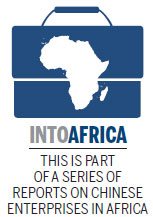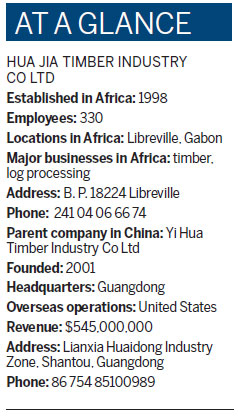|
A employee with Hua Jia Timber Industry Co Ltd at work in Gabon. Photos by Zhang Wei / China Daily |
Chinese timber investments are beginning to take root in Gabon
Jean Marc moved from a French timber company to Hua Jia Timber Industry Co Ltd 14 years ago. He says it was a good choice and he has since been taken good care of by his Chinese boss.
"C'est bon," he says as he walks along the log piles in the factory showing the logs freshly processed by his fellow workers.

His boss' kindness is one factor; the major reason he has stayed on is because Hua Jia has a more complete factory system for timber processing. "It's more professional and makes the whole process smooth," he says.
Jean Marc, 52, is a Libreville native who works with 330 workers including 38 Chinese at Hua Jia. The company owns seven harvestable forest areas, totaling 350,000 hectares, outside Libreville, the capital of Gabon, known for its rich resources in oil, gas and forests.
He supervises the group of workers in the processing factory based in Libreville. "The wood processing industry has helped create quite a few local jobs since the government banned unprocessed timber exports," he says.
Guangdong-based Yi Hua Timber Industry bought a 75 percent stake of Hua Jia last year. The Gabon-based company now mainly feeds Yi Hua processed timber for its furniture line. Kevazingo and Padouk are among the popular types of woods that Hua Jia sends back to China every year.
Lyu Qiuyin, Hua Jia's local manager, who was sent from China's northeastern Heilongjiang last year, says what they do is different from the wood trade business some Chinese and European companies operate in Gabon.
"What we do doesn't really raise any environmental concerns because we cut old trees and we need to protect our harvestable land here in order to make our supply sustainable."
|
Lyu Qiuyin, Hua Jia's manager in Gabon, says what the company does is different to what some Chinese and European companies do in Gabon. |
Unlike other Chinese companies that focus mostly on wood exports to China, Hua Jia has to maintain its harvestable forest areas properly so they maintain a sustainable supply of wood to its parent company every year.
Its seven forest areas were bought by Yi Hua, the parent company, from the Gabonese government on an agreement that the company will be responsible for keeping the condition of the land as well as a payment of 500 francs ($100) every 10,000 hectare per year.

Lyu says Gabon's fine coverage of forest - up to some 80 percent - has attracted many foreign firms that look to export, which has raised the risk of excessive deforestation, especially some rare species like the African blackwood will take up to 70 years to be mature enough to harvest.
"That's something to worry about if this continues.
"Even though we are doing different type of business from most foreign companies, the reputation of foreign timber firms, including the Chinese ones, has been affected, often, in a negative way," Lyu says.
Central African countries, including Gabon, the Republic of Congo and Cameroon, have good forest coverage compared with other parts of Africa. Lyu says Hua Jia may consider expanding to other neighboring countries for the same type of business in coming years.
"Political stability in Africa is always a major concern or factor when we make investment plans," Lyu says.
China-involved projects in Gabon have been taking off in recent years. Most of them are infrastructure related. With the country's forest coverage resource and cheap shipment costs from Gabon to China, more Chinese are investing in timber trade related business.
Ezzel Jebbari, a local consultant for construction projects at China Africa Star Group, a local company invested through Beijing-based Chuanbei Vacuum Technology Co Ltd, says most Chinese investors are well received in Gabon.
Chinese investors show a higher level of patience when they do business in Africa, he says.
"The difference between Chinese companies and European companies here is that the Chinese are more focused," Jebbari says. "When they get a contract, they start it and they delivery it quickly. That's their reputation here."
yuweizhang@chinadailyusa.com
(China Daily Africa Weekly?07/04/2014 page21)
